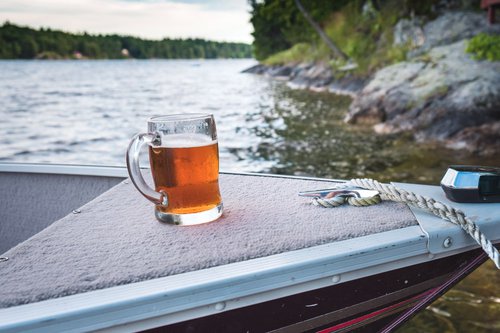Can You Drink on a Boat in Ontario?

The weather is warmer and people want to spend time on the water. Many will want to enjoy an alcoholic beverage while doing so. Before you open or mix anything, it pays to know a bit about the drinking and boating laws Ontario and how they apply in your case. Here are some of the more commonly asked questions and answers that will help you enjoy your boating and remain on the right side of the authorities.
Can You Have Alcohol on a Boat in Canada?
There's nothing that would prohibit you from having alcohol on a boat per se. The more pertinent question is if you can have open containers while on the boat. That's where you have to be more particular about complying with current laws.
When it comes to containers of open alcohol on boat in Ontario, the following must apply: your boat must have a permanent toilet. It must also have permanent sleeping and cooking facilities. It must also be anchored or otherwise secured to a dock. Houseboats and larger vessels will meet these requirements, but smaller ones are not likely to have those features.
To ensure you remain within the limits of the law, take a look at this provision in Ontario's Liquor Licence Act:
"Sec. 32 (3) No person shall operate or have care or control of a boat that is underway while there is contained in the boat any liquor, except under the authority of a license or permit.
Sec.32 (4) Exception-Subsection (3) does not apply if the liquor in the boat, (a) is in a container that is unopened and the seal unbroken, (b) is stored in a closed compartment."
The assumption is that if there are open containers someone is drinking. It may be passengers but it could also be the person who's operating the boat. By setting requirements for the boat proper, it's easier to avoid what could be a suspicious situation.
Do the Laws Vary From One Province to the Next?
There are both national and provincial laws that come into play. The Criminal Code of Canada is clear that operating a boat while under the influence is always illegal. What defines being under the influence? A Blood Alcohol Concentration (BAC) of more than 80mg or 0.08% is considered under the influence. If that figure seems familiar, it should. That's the same definition that applies to operating an automobile.
Along with the Criminal Code, there are laws that apply in specific provinces. For example, Ontario boating and drinking laws include the same prohibitions that are involved with impaired driving or driving under the influence. Like drinking and driving, boating and driving can result in stiff penalties that will follow you around for a long time.
Can You Drink While Operating a Boat?
While passengers are free to imbibe up to a point, the same is not true for the person who will be operating the boat. At all times, the driver or pilot must remain sober. The point is to ensure the safety of everyone who is along for the ride.
That means if there's alcohol on board and you're the operator, drink something other than an alcoholic beverage. The same is true for a yacht, speedboat, or any other type of boat one can imagine. Before bringing any alcohol on boats in Ontario, make sure there's plenty of non-alcoholic beverages for the operator to enjoy without being tempted.
Can You Drink on a Boat If You're Not Driving?
Can a passenger drink on a boat? The answer is yes, as long as the passenger is observing the laws that relate to public intoxication. It's still necessary to observe the legal alcohol limit on a boat even if you're not operating it. That means sipping rather than seeing how many beverages you can down in less than an hour.
The Ontario Provincial Police provide literature related to drinking and being a passenger on any type of boat. The information includes tips on how to enjoy the outing while remaining in compliance with current laws and how to ensure that there are no repercussions from the decision to combine Ontario drinking and boating among passengers.
Can You Drink Alcohol in a Canoe in Ontario?
No matter where you are in Canada, it's not legal to drink while in what's classed as a smaller recreational vehicle. That includes canoes, kayaks, and rafts. It also includes vessels like a pontoon boat in Ontario. The same charges and penalties that apply to operating a small car would apply.
As this relates to Ontario, every prohibition found in Canada's Criminal Code applies. If your BAC is over the legal limit, drinking and driving a boat will land you in a serious trouble. Since there's not much room in a canoe, the presence of alcohol provides plenty of reasons to assume you're drinking.
Can Police Search Your Boat in Canada?
The current drinking and boating laws provide the Marine police with the same authority to look into any situation that seems suspicious. That includes taking measures like conducting spot checks along any waterway in the nation. In Ontario, the Marine police have full authority to approach and board your boat if they suspect that alcohol is being consumed.
This means that you and anyone else on the boat may be asked to take a Breathalyzer test. Remember that while you can refuse, the outcome is that you will be escorted to the nearest police station where further action may be taken. Opting to follow current laws related to boating and alcohol will mean that even if the Marine police approach your boat, there will be nothing for them to find.
What are the Penalties If You're Caught Drinking on a Boat?
The criminal code boating and drinking penalties are the same as those that apply to driving while under the influence or impaired driving on land. You run the risk of losing your boating licence for a time, paying stiff penalties, and possibly spending some time behind bars. You also end up with a criminal record.
All of the above applies if you're caught drinking on a boat in Ontario. You may have your boating licence suspended for a year. Ontario also has an Interlock Ignition Program that would apply on land as well as on the water. Even if you do manage to maintain your licence, complying with the provisions in that program will be mandatory.
The bottom line is that the best solution is don't drink and boat. Failing that, make sure your boat is of the type and has the features necessary to allow alcohol to be consumed on board. Confirm that your boat is properly moored while the drinking is in progress. If you plan on operating the boat at any point, it would be in your best interests to ensure that your BAC remains well below the legal limit. Under no circumstances should you allow open containers in the boat while travelling across the water.
If you do find yourself facing charges, seek legal representation at once . Doing so is the only option for ensuring your rights are protected and that all available relevant factors are taken into consideration.
